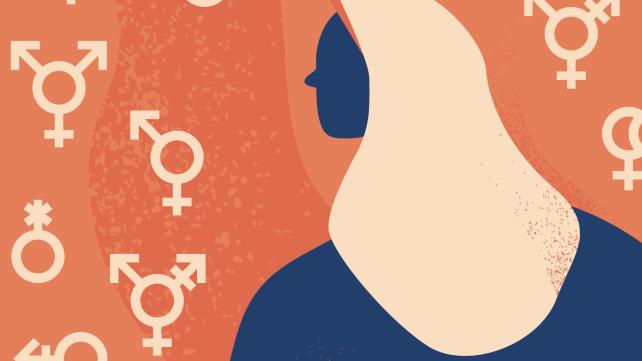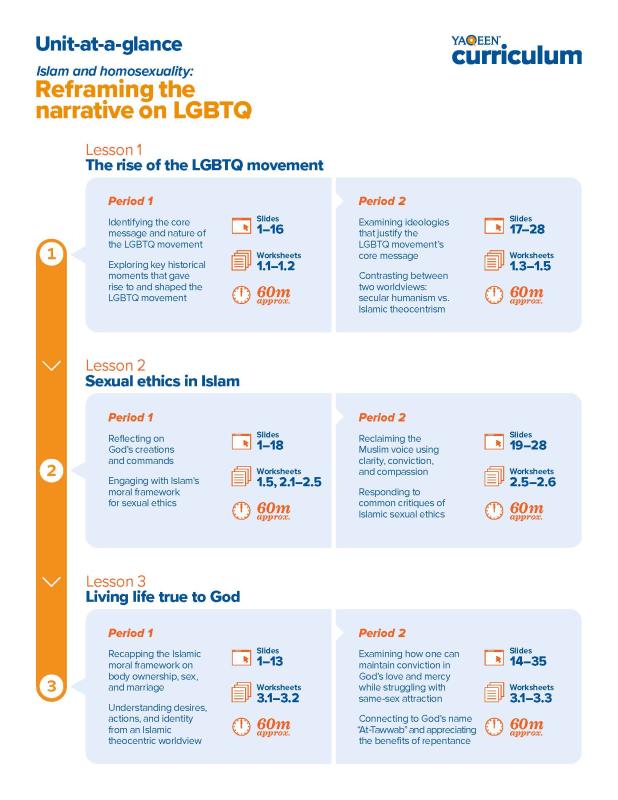
Yaqeen Institute is a reliable source of Islamic guidance on a wide variety of topics. Their efforts to ensure that educators have the tools they need to tackle contemporary challenges facing Muslim youth in North America are impressive and have included the development of curricula on tough topics that are readily available for use in classrooms. Scholars and educators have utilized an engaging framework to prompt critical thinking and lead discussions. The interactive approach is well suited to meet contemporary needs and seeks to increase understanding of the topics from a uniquely Islamic lens, building confidence for students and teachers alike.
One such topic explores the biggest challenge of our time - Islam and Homosexuality: Reframing the Narrative on LGBTQ. The comprehensive curriculum is designed expressly for students in grades 11 and 12 and is divided into three units:
- Rise of the LGBTQ movement
- Sexual ethics in Islam
- Living life true to God
A comprehensive summary of the curriculum is provided to encourage parents, educators, schools, youth leaders, and masjid communities to utilize Yaqeen’s resources to educate Muslims of all ages about LGBTQ matters.
Prior to even beginning the lessons, there is a message which lays out five important points to keep in mind prior to using the curriculum. Much detail is provided to ensure that the teacher is him/herself comfortable with resources that are provided and with teaching the material. There is also a reminder that discussions could reveal information about students who actually have same-sex attractions or other challenges related to the topic. Educators are also provided with resources for students who may need additional support.
There are also five fundamental principles based on the Quran and Sunnah regarding the LGBTQ+ movement that are expressly stated and permeate throughout:
- Any sexual relationships outside of those sanctioned by the Quran and Sunnah between a man and woman is haram (impermissible).
- Desires are not sinful, and people should not be identified with or ostracized because of their desires. Instead, every Muslim is defined by their Islam (i.e., their submission to God alone).
- Same-sex actions are haram (impermissible). Someone who acts upon same-sex desires commits a sin, but they remain within the fold of Islam, as long as they do not claim that what is haram is halal and vice versa. On the other hand, someone who does not act upon same-sex desires is rewarded by God for striving in the way of God.
- We have, and always will, condemn mistreatment and violence on the basis of sexual preferences, lifestyles, and beliefs. This does not mean that what God has made haram becomes halal.
- We should show all people the beauty of the prophetic way and be the best of neighbors and colleagues. In doing so, however, we do not celebrate or support what God has prohibited, which would be a form of corruption and cannot be done in the name of social cohesion or political advancement.

Unit 1: Rise of the LGBTQ Movement
The inclusion of a history of the LGBTQ Movement in the curriculum is an important way to tread into the topic and this 28-page unit dissects both key historical moments and the ideologies or beliefs that everyone is expected to except. There is a recognition that some of these beliefs include the claim that “love is love,” and that every individual has the right to publicly express and act upon their sexual desires. These may seem mundane, however, are antithetical to Islamic guidance.
Students begin this section by exploring the historical context and timeline that gave rise to the movement and a review of the worldviews that support it. Devoid of any God-centered fundamental beliefs, LGBTQ proponents are encouraged to create their own moral framework. The unit provides a slide deck, worksheets, guided discussion questions, videos, and a unit review to enhance understanding and retention. There is an in-depth discussion of the hegemonic nature of the movement, which promotes a dominant viewpoint that overtakes and limits all other views. Teacher’s Notes and Teacher Takeaways also provide nasihah or sound advice in certain instances.
Another interesting activity is about the messages around us and how those messages and our responses to them influence our own worldviews. Three specific views are examined: expressive individualism, moral relativism, and humanism. Care is taken to ensure that students understand the terminology and concepts and also are able to “connect the dots” in understanding how history has given rise to the present state of affairs.
Unit 2: Sexual Ethics in Islam
Objectives in this 16-page unit are centered on the principles and perspectives on sexual ethics in Islam and teaching students to articulate that theocentric worldview related to LGBTQ issues. Early on, there is a reiteration of the contrast between the humanistic worldview, which dominates the Western world and prioritizes individual happiness and pleasure when it comes to our bodies, morality, sex, and sexuality, and the Islamic worldview that centers around Islamic guidance provided on all matters by the Quran and Sunnah.
There are lessons that focus on the beauty of creation and what we can learn from examining it. That focus on the purpose of our life in this world, and also on defining morality and one’s moral compass. The main activity in this unit is an exercise that allows students to explore three stations – body ownership, sex, and marriage. Each station has a resource with Quranic citations, ahadith, and multimedia. By providing details related to Islamic guidance students can affirm that Islam as a way of life is complete and provides us with a blueprint about how to deal with every challenge in this world.
Unit 3: Living Life True to God
The final 23-page unit provides students with tools to navigate the difficulties associated with desires, particularly same-sex attraction. A case study of Dawud who is experiencing same-sex attractions encourages students to understand that desires are natural and not in and of themselves haram. Students explore Allah’s Name: At-Tawwab, the One Who accepts repentance. Notetaking and reflection exercises encourage students to actively listen, empathize, and recognize that “desires are morally neutral and out of our control.” And as part of Allah’s plan, our desires serve a purpose – they are a test of our submission.
The next logical step is to focus attention on the notion of one’s identity. The contrast between someone who identifies as a member of the LGBTQ community, identifying with their sexual desires, and a believer whose primary purpose is to worship Allah alone, is stark. The remainder of the lesson utilizes audio, video, Quranic ayaat, in-depth discussion of tawbah or repentence, and reflection to encourage students to think about how they might give nasihah and support Dawud’s struggle.
At the end of the unit, it is revealed that Dawud’s story is, in fact, the real-life experience of Muhammad ibn Dawud al-Zahiri, a hafiz of Quran and scholar of Islamic law from Baghdad who died in 272 AH/884 CE. Dawud struggled with same-sex attraction throughout his life but never acted upon these desires. And he was not limited in his community by them.
Using the Curriculum in your Community
The Yaqeen Institute curriculum is not just a good read. It is designed to be used – FREE of charge – by families, schools, youth groups, and communities - to provide a detailed framework that dissects the LGBTQ issue on a wide variety of levels and to build a framework that encourages our youth to fully understand the issues from an Islamic perspective. Beyond understanding, the study can give Muslim students the confidence to actively push back on elements of the issue that essentially challenge our Islamic way of life.
The Prophet Muhammad, peace and blessings be upon him, said:
“Whosoever of you sees an evil, let him change it with his hand; and if he is not able to do so, then [let him change it] with his tongue; and if he is not able to do so, then with his heart – and that is the weakest of faith.”
(Muslim)
Kudos to Yaqeen Institute for taking the initiative to support our community with their knowledge, insights, and resources. May Allah SWT help us all to expand our understanding and teach others Islamic guidance on this issue and many more. Ameen.
You can check out and utilize the entire curriculum at Islam and homosexuality: Reframing the narrative on LGBTQ.
Zahirah Lynn Eppard is the managing editor of the Muslim Home parenting newsletter project. As Sound Vision’s Director of Religious Education, she has also spearheaded the production of more than 400 online classes serving children ages 3-12 in the Adam’s World and Colors of Islam Clubs. Eppard has also worked in the field of education as a teacher, homeschooler, and Islamic school principal, as a marital and crisis intervention counselor, and as a lobbyist, and social justice activist. She lives with her husband, children, and grandchildren in Maryland



Add new comment